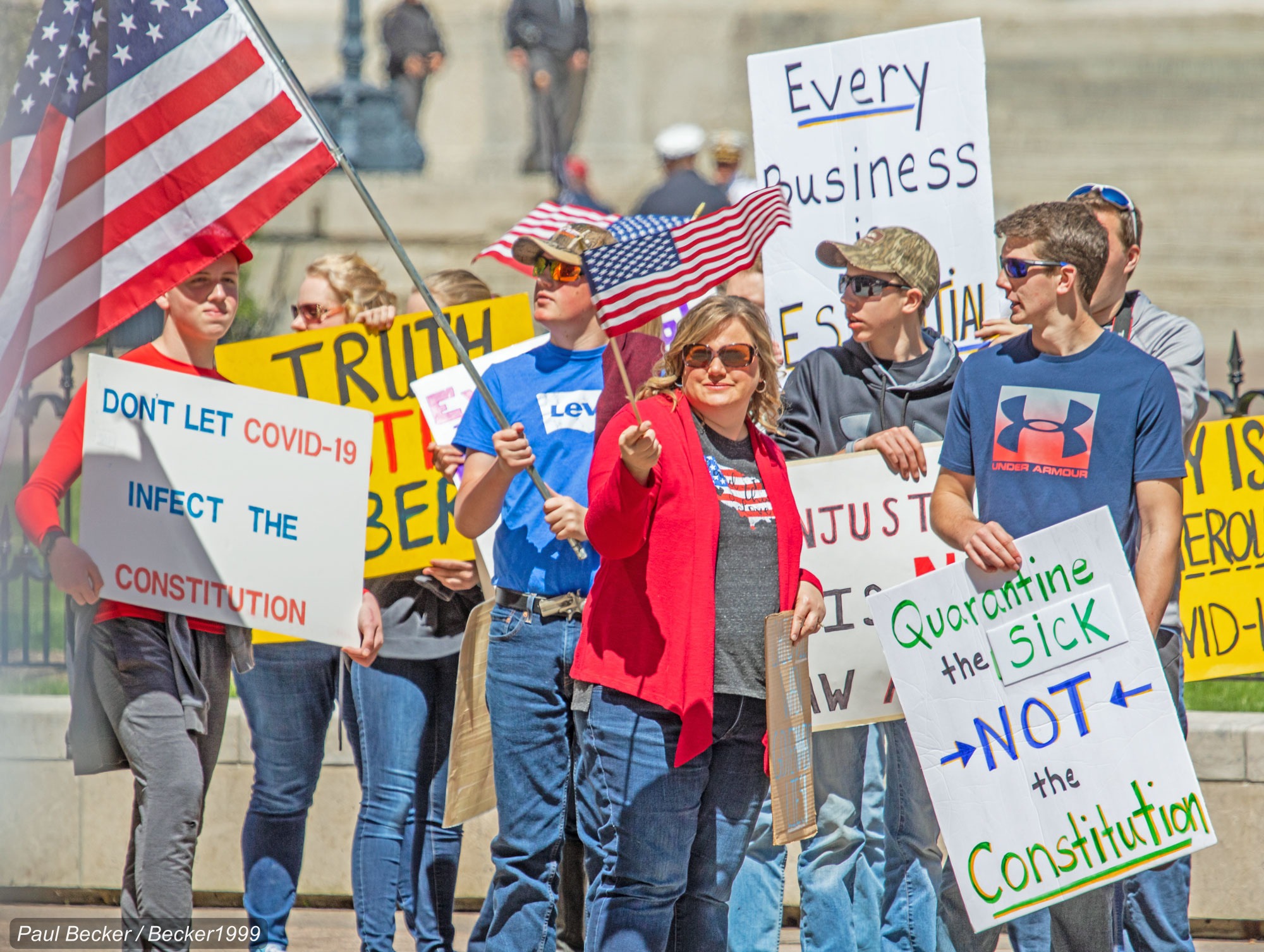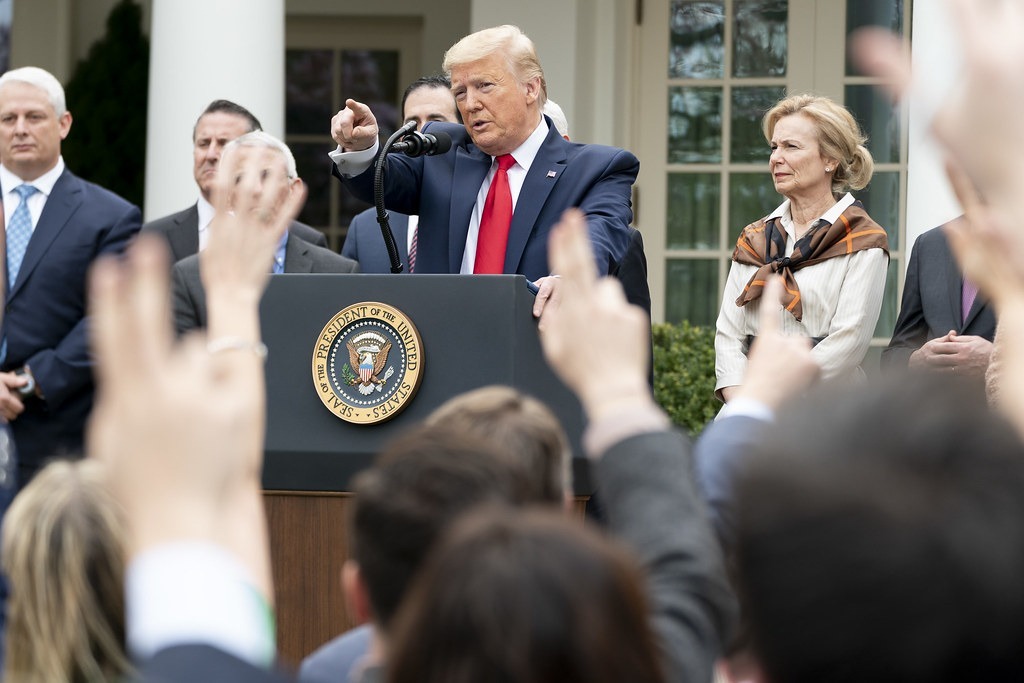The Moral Foundations of Anti-Lockdown Anger

By Richard Milner
Staff Writer
10/5/2020

The past few weeks have seen a string of protests against the lockdown measures in America, with a vocal minority of people disregarding health recommendations to assemble in public, carrying signs equating social distancing measures with oppression, and common sense with communism. Last week, protestors armed with assault rifles occupied Michigan’s state legislature to demand an end to the lockdown.
It’s easy to dismiss such behavior as madness or stupidity, but it’s more productive to try to understand it. To do so, it’s useful to look to Moral Foundations Theory, particularly the work of Jonathan Haidt, Thomas Cooley Professor of Ethical Leadership at New York University.
In The Righteous Mind: Why Good People are Divided by Politics and Religion, Haidt outlined a set of metrics that underlie people’s moral leanings. As a social psychologist, Haidt based his work on an evolutionary model of human behavior, which explains modern human behavior in terms of instincts that developed over hundreds of thousands of years, like banding together in tribes, forming leadership hierarchies, developing empathy to support group members, and avoiding environmental dangers.
Haidt identified six foundations of morality:
- Care/harm: The empathy needed to safeguard children and the vulnerable.
- Fairness/cheating: The expectations surrounding reciprocal altruism and the proportionate allocation of resources.
- Loyalty/betrayal: For group cohesion.
- Authority/subversion: Deference to leadership and authority that enables quick decision-making and coordination in difficult times.
- Sanctity/degradation: Aversion to contaminants (e.g. waste products, pathogens, poisons) that could sicken the group. In modern times, this has evolved to keeping contaminants like taboo ideas from infecting values the group deems sacrosanct.
- Liberty/oppression: Rejection of power seen as illegitimate for the purposes of ousting unworthy alphas.
Haidt has gathered tens of thousands of data points over the years through his website www.yourmorals.org, which contains questionnaires designed to explore respondents’ personal ethics, and used them to find relationships between moral foundations and people’s politics. He found that people who identify as liberal typically focus more on care and fairness, whereas people who identify as conservative care more about loyalty, authority, and sanctity. Both liberals and conservatives value liberty, but they express this in different ways: whilst, for liberals (for whom care is another major concern), liberty usually means support for the underdog against oppression, for conservatives (for whom in-group loyalty is another major concern), liberty usually means freedom from outsiders telling them what to do.

Electoral map in the 2016 presidential election
At first glance, Moral Foundations Theory might not seem to explain the responses to the lockdown very well. After all, the anti-lockdown protestors are overwhelmingly conservative (though they comprise a tiny minority of the conservative population, most of whom are supportive of the lockdown). Aren’t these right-wing protestors defying government authority and disregarding sanctity by willfully exposing themselves to the risk of contracting the coronavirus? In other situations they’d be the first to tell people to “Follow the rules,” or to be careful what to allow inside their bodies.
In other situations these right-wing protestors would be the first to tell people to “Follow the rules.”
But it should be noted that their group’s ultimate authority, President Donald Trump, has repeatedly expressed skepticism about the severity of the COVID-19 outbreak, cast doubt on medical expertise, and lamented the damage the lockdown is doing to the economy, culminating in his incendiary tweets to “Liberate Minnesota.” Protestors may be defying the authority of their governors, police, and health experts, but at the same time are also obeying the wishes of a higher authority – President Trump. They might be disregarding sanctity by increasing their chances of catching or spreading COVID-19, but they’re also protecting one of their most sacred values (limited government). By protesting, they also demonstrate loyalty to their group’s precepts (belief in limited government and their Dear Leader), as well as assert their liberty against what they deem illegitimate authorities (governors and medical experts) trying to tell them what to do.

By contrast, liberals are now the ones “following the rules” by staying home and abiding by sensible lockdown orders, their rebellious instincts of their liberty foundation superseded by their concern for the vulnerable in their care foundation.
Both liberals and the conservative protestors seem to believe their behavior is moral. But what is moral to a liberal may not be the same as what is moral to a conservative because they focus on different moral foundations (or different aspects of them). Much of the misunderstanding between them is due to these inherent differences.
What is moral to a liberal may not be the same as what is moral to a conservative because they focus on different moral foundations (or different aspects of them).
These are difficult times for everyone, but it’s important for all citizens to reach across the political aisle and try to find common ground. Instead of trying to appeal to conservative protestors in terms of care for the vulnerable and “the common good,” perhaps liberals should appeal to them in terms of the things they care most about, for example, reminding them that whilst they feel compelled to be loyal to their group, they owe a higher loyalty to a larger group (the United States) and the welfare of their fellow citizens, or that carrying and spreading diseases like the coronavirus is somewhat gross, or that in exercising their right to assemble in disregard of social distancing advice they’re jeopardizing others’ right to life. Perhaps then they’ll be able to unite against the common foe that is the virus.
Related posts:
Are Anti-Lockdown Protests Legal?
The Culture Factor in COVID-19
Modi and His Supporters Face a COVID Reckoning
Tablighi Superspreaders in Pakistan
Allegory in the Time of Coronavirus
Your Odds of Dying From COVID-19 Depend on How Polluted Your Air Is
Japanese Culture Isn’t Designed to Handle a Pandemic
The Coronavirus and the Crisis of Responsibility
To See How Coronavirus Outbreak might Play Out, Look at This Virtual Plague
FAKE NEWS | Nothing to Worry About, Says Wuhan Official From Inside Biohazard Suit
